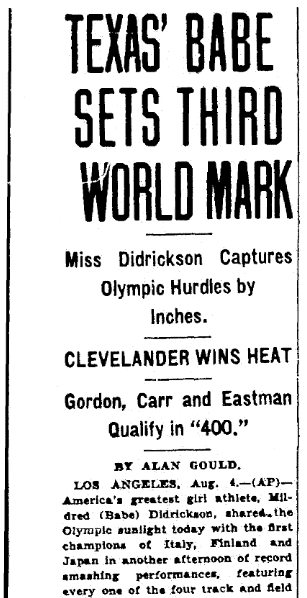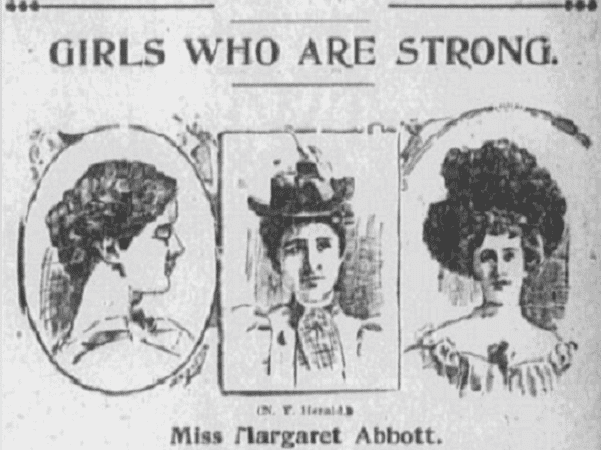Introduction: In this article – in honor of Women’s History Month – Gena Philibert-Ortega searches old newspapers to learn more about four American record-setting sporting women. Gena is a genealogist and author of the book “From the Family Kitchen.”
Love sports? Can you name some of the most important women athletes of the 20th century? Chances are you might have some trouble. Female athletes don’t always get the attention they deserve.
To research this article, I searched for articles about sporting women in GenealogyBank’s Historical Newspaper Archives. I found many interesting articles about a number of women athletes – and I’ll admit that I had only heard of one of the following women. As I read more about their lives I was amazed at what these women achieved in sports like golf, swimming, and track and field – and how in some cases they were beating records set by male athletes. Who are these women? Let’s take a short look at what the newspapers had to say.
Babe Didrikson Zaharias (1911-1956)
Mildred Ella “Babe” Didrikson Zaharias was a successful athlete in multiple sports including golf, basketball, and track and field. She was a versatile athlete that took to every sport she tried with ease.
While I tend to associate her with golf, as a young woman Babe successfully competed in the 1932 Olympics held in Los Angeles, taking home two golds and one silver medal in track and field events.

Of course she also played golf later in life. In the 1930s she started playing golf professionally and would become a founding member of the Ladies Professional Golf Association.
There’s no doubt that sports ran through Babe’s blood. Like many successful women, the media didn’t always report on her achievements but instead wanted to know more about her personal life – including when she was going to get married. In this 1932 newspaper article she likens marriage to a decathlon that didn’t interest her. In response to the question of whether she had a “feller” she detailed the wife’s daily decathlon:
Here’s the 10 events: Dish washing, scrubbing, washing, cooking meals, cleaning the house, caring for the baby, going to the grocer, hanging up the ice-card, making the beds and darning socks. I’m an all-around athlete but there are 10 events that would wear me out.
Surprisingly, it wasn’t too many years later that Babe Didrikson did marry. She and fellow athlete George Zaharias, whom she met during a golf tournament, were married in December 1938 and would remain together until her death in 1956.
Margaret Ives Abbott (1876-1955)
How would you like to earn Olympic gold but go through life never knowing it? That’s exactly what happened to Margaret Ives Abbott, daughter of writer Mary Ives Abbott, who played and won a nine-hole golf tournament at the 1900 Paris Olympics. But because of the disorganization of the games she didn’t realize she was competing in the Olympics. The 1900 games were very different from what we are accustomed to today. For one thing, there were no opening or closing ceremonies, and despite being the “Summer” games they were held over a five-month period, from May 14 to October 28. It’s easy to see how the athletes, and everyone else, might have been confused.
Before Margaret’s Olympic win, she was already known as a golf champion. This 1898 newspaper article proclaims:
Miss Abbott plays on both the Wheaton and Onwentsia links and has won prizes at the game. In some quarters she is thought to be the coming woman of the West.
A short notice in this 1900 newspaper about Margaret’s October 1900 Paris golf tournament win is most likely reporting her Olympic victory. It is noted that she won an “old Saxon porcelain bowl.” The Olympians of the 1900 games did not receive medals as they do today.
Two years after the Olympics, in 1902, Margaret had a big year. The “Queen of Golf” played in the golf tournament at La Boulie in Paris and married Chicago writer Finley Peter Dunne, who was a newspaper colleague of her mother’s. Margaret would continue to play golf as she raised her family. She died in 1955 never realizing she was an Olympic champion.
Alice Coachman (1923-2014)
Born in 1923 in the segregated South, Alice Coachman grew up in a discouraging time for African American women athletes. But that didn’t stop her. She trained the best she could using homemade equipment, which led to her eventually competing for national titles in high jump – winning 10 titles in a row from 1939 to 1948. Because of the cancellation of the 1940 and 1944 Olympic Games, Coachman’s first opportunity to compete was in the 1948 London games. It was there that she won the high jump gold by leaping 5’6 1/8” in the air. Coachman was the first African American woman to win an Olympic gold medal and went on to be the first to secure an endorsement deal.
Alice Coachman’s athletic career was very brief. After winning Olympic gold she retired from sports at the age of 25 and spent the rest of her life teaching.
Gertrude Ederle (1905-2003)
We’ve looked at three women who made Olympic history. The last athlete I researched didn’t compete in the Olympic – but there’s no doubt she has a place in sports history.
Crossing the English Channel is a 21-mile swimming challenge. The first person to swim the English Channel without assistance was Matthew Webb in 1875. No one would successfully cross the Channel again until 1911. It was believed that women were too delicate for such an arduous sports challenge, but in 1926 four women were up for that challenge. One of those women, American Gertrude Ederle, had tried unsuccessfully in 1925 but her second attempt a year later was successful. She became the first woman to swim the English Channel, leading to a newspaper headline that proclaimed: “Gertrude Ederle Swims Channel. U.S. Star First Woman to Accomplish Feat.”
This article is a great account of her 1926 record-breaking attempt. It also includes a smaller article about Gertrude’s rival Lillian Cannon, who cheered Gertrude on as she swam. The article recounts:
When Gertrude was six and one-half miles off the English Coast at 3:10 p.m. Lillian sportingly donned a suit abroad the La Morinie and was rowed over to the Ederle tug. She was greeted with cheers.
Lillian climbed abroad the Alsace and dived from the deck into the water where Gertrude greeted her with a smile.
“Hello Lillian,” she said. “We are fifty miles from nowhere.”
“Why, you are almost there,” replied Lillian.
Gertrude did keep swimming and made it to England, shaving two hours off the best time from a male swimmer.
After her Channel feat Gertrude continued swimming, eventually working as a swimming teacher for deaf children. She died in 2003 at the age of 98 years.
Sporting Women
Whether you are researching a female family member that played sports in school, or a woman who won Olympic gold, you can find information about sporting women in old newspapers. Good luck with your own research!
Related Articles:
